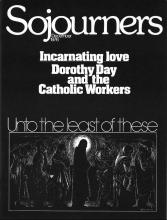Block-long faceless buildings slowly become neglected Victorians as Karen, George, and I leave downtown San Francisco on wet, tired feet. It is getting quite dark as we begin to walk through the jungle of the Fillmore district. Not a place for three young whites to be wandering about at night. The conversation is sparse. We try to appear confident, heading for the free crash pad on Golden Gate Avenue where we will spend the night, if there is room.
I am foreign to this environment, this place of storefront homes and street-corner bars. Its contrast with my background overwhelms me. That makes me remember who we really are: students involved with Westmont College’s Urban Program, a semester spent living and working in San Francisco. Our Urban Studies class begins with an “urban plunge”: a two-night, three-day experiment in city survival, our resources being only $1 and an ID.
But I try to forget the program. I must try to feel, to know the pain of being cut off from any other life. I do not hate as these people do, nor can I know the powerlessness of the unfortunates I’ve seen today. But I have to try to understand. I must know, even for this short time, what it means to be society’s victim.
The only signs of life I see lurk behind closed curtains. Is this place really as evil as I’ve been taught? Such thoughts occupy me until we see a crowd gathering on the sidewalk ahead. We recognize other Westmont students waiting outside a house that we realize is our destination. We try not to show our relief at seeing familiar faces.
Read the Full Article

